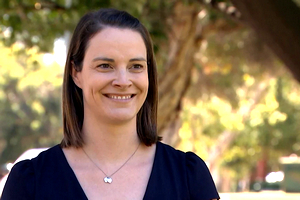
|
|
Perth recorded a string of six consecutive days above 40 degrees
Celsius as temperature records kept tumbling. (ABC News: Jon Sambell)
|
Key Points
|
While numbers will not be technically official until Tuesday, Bureau of Meteorology figures show Perth's average maximum temperature is currently 33.2 degrees Celsius — well above the previous record of 32.3 set in 2012/13.
It means the city is guaranteed to break the record even without the final day's temperature, forecast to be 36C.
Several regional towns through the Central West, Wheatbelt, Great Southern and South West are also likely to break summer records.
The numbers speak for themselves
When you look at individual days, it is easy to see why.
Perth set a summer record of 13 days above 40C, six of which were consecutive.
Perth also experienced a record number of days above 35C, and in January Onslow equalled Australia's hottest ever temperature, reaching 50.7C.

BOM forecaster Jessica Lingard says there's been an
unusual number of heat records broken this summer. (ABC: Greg Pollock)
|
"So many places have had their hottest Christmas, their hottest December, their hottest January," Ms Lingard said.
"There has just been an awful lot of records broken this season and it's quite unusual."What's been driving the heat?
In terms of weather systems, Ms Lingard said it was the usual heat-bearing systems that fuelled the hot weather.

|
|
Perth has endured its hottest summer on record. (ABC News: Hugh Sando)
|
But she said this year the systems were sticking around for much longer than normal, allowing the heat to build.
"They usually transition eastwards fairly rapidly, forming a west coast trough and then a couple of days later it moves inland," she said.
"But we've been seeing these west coast troughs really hanging around for a long time.
"We're talking four to seven days, so that really allows all that warm air from inland parts to penetrate right into coastal areas."
Challenging fire season
The conditions have had devastating consequences, even for regions that only experienced short bursts of heat.
In early February, four out-of-control bushfires were burning at the same time — ultimately destroying homes in Denmark, Bridgetown and Corrigin.

|
| In February 2021 an out-out-control bushfire doubled in size overnight in Denmark, destroying three houses. (Supplied: Emily Harper) |
One home in Jerramungup was lost along with two in Hopetoun.
Department of Fire and Emergency Services Commissioner Daren Klemm said conditions had been particularly severe this year.
"We've had some really challenging, complex fires in particularly difficult fire weather," he said.
Fingerprint of climate change
Unfortunately, climate science indicates this is just the start.
Rainfall has declined significantly in the last 50 years over WA's south-west.
While it can be difficult for scientists to directly attribute extreme weather events to climate change, climate scientist Andrew King said Perth's summer clearly bore the fingerprint of global warming.
"Given the background trends and previous work looking at heatwaves and their links to climate change in different parts of Australia, and our understanding of how the climate system works, we can be quite confident that climate change has exacerbated the heat and Perth the summer," Dr King said.
He said there would still be cooler summers in future, but climate change had loaded the dice to make hot years more common.
"Because we've got such a clear trend in temperatures across the whole of Australia, including in Western Australia, it's just quite easy to break records these days," he said."I guess an analogy to that is you can think of like COVID cases.
"If you've got an outbreak occurring, you can have record numbers of cases each day, day after day, when you've got a strong trend in case numbers.
"In a way, temperature trends are a bit like that, when you've got a very clear trend, it's very easy to break records so you break them more frequently."

|
|
Dr Andrew King says there's very little doubt that WA's hot summer
was influenced by climate change. (ABC Weather: Kate Doyle) |
"However, if we try and reduce our greenhouse gas emissions and try and stick to the Paris Agreement, that would help a lot.
"We would see slightly worse heat waves than we do now, but not as bad as if we just keep emitting greenhouse gases."
Links
- Why Western Australia's south-west is drying out at one of the worst rates in the world
- Perth and the Pilbara have sweltered this summer: here's why
- (AU The Guardian) WA Bushfires Linked To Climate Change As At Least Five Homes Lost
- Bridgetown And Denmark Bushfires: Resident Critical, At Least Five Properties Lost As Blazes Rage In WA South
- (AU ABC) Coral Reef Safe Zones Set To Plummet, While Potential Bleaching Events Loom In Qld, WA
- (AU ABC) Gascoyne Bushfires Burn For Two Weeks, Killing Livestock, Destroying Land And Devastating Pastoralists
- (AU ABC) Is Climate Change Behind Record-Breaking Temperatures In The Pilbara?
- What drove Perth’s record-smashing heatwave – and why it’s a taste of things to come
- Perth swelters through record six consecutive days over 40C temperatures
- Australia equals hottest day on record at 50.7C
- Why WA’s extreme heat this summer is a worrying glimpse into a dangerous future

No comments:
Post a Comment